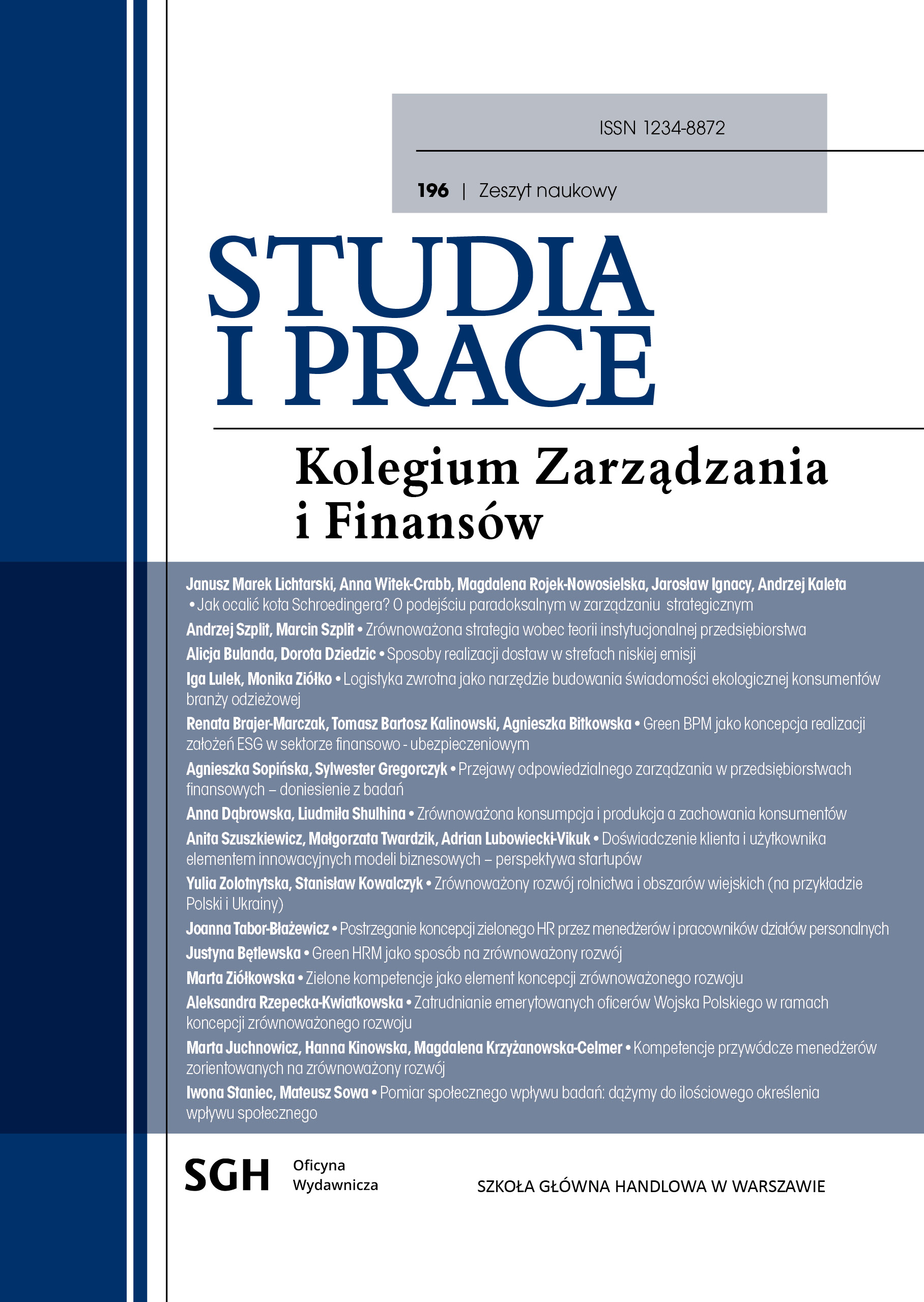Measuring the social impact of research: pursuing its quantitative assessment
DOI:
https://doi.org/10.33119/SIP.2024.196.15Keywords:
research evaluation, science communication, social impact, measurement of social impact, quantitative measuresAbstract
The question whether there are appropriate quantitative indicators for determining the social impact of scientific research initiated the creation of this work. The paper uses desk research to present the background data, i.e. previous research, the current state of knowledge, policies in place at universities regarding approaches to quantitative measurement of social impact. The review presents possible methods and problems of measuring the social impact of research, describes the importance of case studies and different approaches to the process of measuring social impact. The review indicates that research should start with the identification of social impact and focus on the right approach to measuring social impact. It is shown that conclusions based on quantitative data in the evaluation of scientific research should be drawn with great caution and should always be supplemented by qualitative description.
Downloads
References
Wydawnictwa zwarte
Grant, J., Brutscher, P.‑B., Kirk, S. E., Butler, L., Wooding, S. (2010). Capturing Research Impacts: A Review of International Practice. Documented Briefing. Cambridge: RAND Corporation.
Molas-Gallart, J., Salter, A., Patel, P., Scott, A., Duran, X. (2002). Measuring Third Stream Activities Final Report to the Russell Group of Universities. SPRU: University of Sussex.
Ofir, Z., Schwandt, T., Duggan, C., McLean, R. (2016). Research Quality Plus (RQ+): a holistic approach to evaluating research. Ottawa: IDRC. http://hdl.handle.net/10625/56528.
Artykuły naukowe
Alomoto, W., Niñerola, A., Pié, L. (2022). Social Impact Assessment: A Systematic Review of Literature, Social Indicators Research, 161 (1), 225–250. DOI: 10.1007/S11205-021-02809-1/FIGURES/7.
Bornmann, L. (2012). Measuring the societal impact of research: research is less and less assessed on scientific impact alone--we should aim to quantify the increasingly important contributions of science to society, EMBO reports, 13 (8), s. 673–676. DOI: 10.1038/embor.2012.99.
Bornmann, L. (2013). What is societal impact of research and how can it be assessed? a literature survey, Journal of the American Society for Information Science and Technology, 64 (2), s. 217–233. DOI: 10.1002/asi.22803.
Bozeman, B., Sarewitz, D. (2011). Public Value Mapping and Science Policy Evaluation, Minerva, 49 (1), s. 1–23. DOI: 10.1007/S11024-011-9161-7/TABLES/2.
Brandão, A. S., Santos, J. M. R. C.A. (2023). On the societal impact of publicly funded Circular Bioeconomy research in Europe, Research Evaluation, 32 (2), s. 441–457. DOI: 10.1093/RESEVAL/RVAD002.
Cruz Rivera, S., Kyte, D. G., Aiyegbusi, O. L., Keeley, T. J., Calvert, M. J. (2017). Assessing the impact of healthcare research: A systematic review of methodological frameworks, PLOS Medicine, 14 (8), e1002370. DOI: 10.1371/JOURNAL.PMED.1002370.
Donovan, C. (2011). State of the art in assessing research impact: introduction to a special issue, Research Evaluation, 20 (3), s. 175–179. DOI: 10.3152/095820211X13118583635918.
Ernø-Kjølhede, E., Hansson, F. (2011). Measuring research performance during a changing relationship between science and society, Research Evaluation, 20 (2), s. 130–142. DOI: 10.3152/095820211X12941371876544.
Hudson, P. (2021). Mariana Mazzucato: Mission Economy: A Moonshot Guide to Changing Capitalism, Society, 58 (4), s. 324–327. DOI: 10.1007/S12115-021-00619–2.
Martin, B. R. (2011). The Research Excellence Framework and the ‘impact agenda’: are we creating a Frankenstein monster?, Research Evaluation, 20 (3), s. 247–254. DOI: 10.3152/095820211X13118583635693.
Mazzucato, M. (2018). Mission-oriented innovation policies: challenges and opportunities, Industrial and Corporate Change, 27 (5), s. 803–815. DOI: 10.1093/ICC/DTY034.
Morgan Jones, M., Manville, C., Chataway, J. (2022). Learning from the UK’s research impact assessment exercise: a case study of a retrospective impact assessment exercise and questions for the future, Journal of Technology Transfer, 47 (3), s. 722–746. DOI: 10.1007/S10961-017-9608-6.
Nightingale, P., Scott, A. (2007). Peer review and the relevance gap: Ten suggestions for policy-makers, Science and Public Policy, 34 (8), s. 543–553. DOI: 10.3152/030234207X254396.
Pedersen, D. B., Grønvad, J. F., Hvidtfeldt, R. (2020). Methods for mapping the impact of social sciences and humanities – A literature review, Research Evaluation, 29 (1), s. 4–21. DOI:10.1093/RESEVAL/RVZ033.
Smith, R. (2001). Measuring the social impact of research, BMJ, 323 (7312), s. 528–528. DOI: 10.1136/bmj.323.7312.528.
Sørensen, O. H., Bjørner, J., Holtermann, A., Dyreborg, J., Sørli, J. B., Kristiansen, J., Nielsen, S. B. (2022). Measuring societal impact of research – Developing and validating an impact instrument for occupational health and safety, Research Evaluation, 31 (1), s. 118–131. DOI: 10.1093/reseval/rvab036.
Tahamtan, I., Bornmann, L. (2020). Altmetrics and societal impact measurements: Match or mismatch? A literature review, El Profesional de la Información, 29 (1), s. 1699–2407. DOI: 10.3145/epi.2020.ene.02.
Theodoraki, C., Messeghem, K., Rice, M. P. (2018). A social capital approach to the development of sustainable entrepreneurial ecosystems: an explorative study, Small Business Economics, 51 (1), s. 153–170. DOI: 10.1007/s11187-017-9924-0.
Van Der Meulen, B., Rip, A. (2000). Evaluation of societal quality of public sector research in the Netherlands, Research Evaluation, 9 (1), s. 11–25. DOI: 10.3152/147154400781777449.
Zakrzewska-Bielawska, A., Flaszewska, S., Grębosz-Krawczyk, M., Staniec, I. (2023). Raport z badań nt. Wzmocnienia potencjału komercjalizacyjnego jednostek naukowo-badawczych z województwa łódzkiego – waloryzacja wiedzy na poziomie regionalnym przygotowany dla Urzędu Marszałkowskiego Województwa Łódzkiego.
Materiały internetowe
Kocmi, T., Zouhar, V., Federmann, C., Post, M., Zürich, E. (2024). Navigating the Metrics Maze: Reconciling Score Magnitudes and Accuracies, https://arxiv.org/abs/2401.06760v1 (dostęp: 1.03.2024).
Komisja Europejska (2022). Zalecenie 2022/2415 w sprawie zasad przewodnich w odniesieniu do waloryzacji wiedzy, https://sip.lex.pl/akty-prawne/dzienniki-UE/zalecenie-2022-2415‑wsprawie-zasad-przewodnich-w-odniesieniu-do-waloryzacji-72090807 (dostęp: 01.03.2024).
Research Excellence Framework – UKRI. (2023, grudzień 20). UK Research and Innovation, https://www.ukri.org/who-we-are/research-england/research-excellence/research-excellenceframework/(dostęp: 01.03.2024).
Vught, F. A. van, Ziegele, F. (2011). U-Multirank: design and testing the feasability of a multidimensional global university ranking: final report, Consortium for Higher Education and Research Performance Assessment,https://research.utwente.nl/en/publications/u-multirankdesign-and-testing-the-feasability-of-a-multidimensio.
Downloads
Published
How to Cite
Issue
Section
License
Copyright (c) 2024 Studies and Work of the Collegium of Management and Finance

This work is licensed under a Creative Commons Attribution 4.0 International License.









